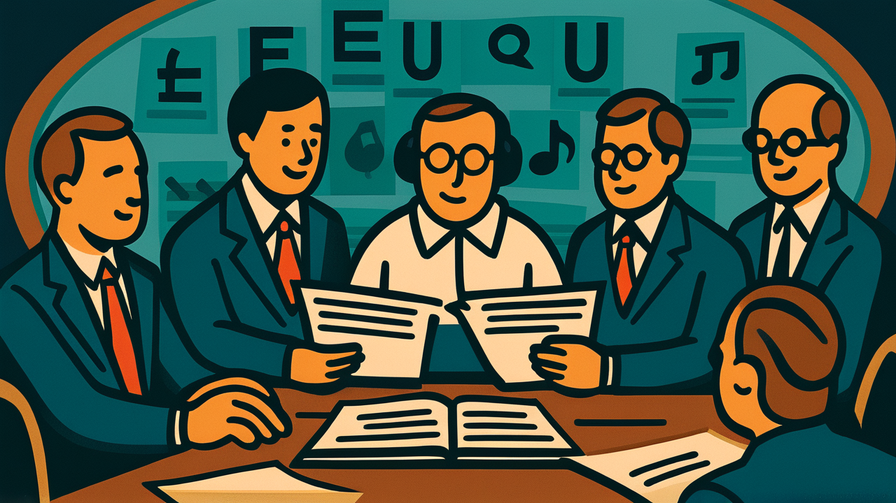[Disclaimer] This article is reconstructed based on information from external sources. Please verify the original source before referring to this content.
News Summary
The following content was published online. A translated summary is presented below. See the source for details.
The European Commission announced on July 22, 2025, in Brussels, that it has opened an in-depth investigation into Universal Music Group’s (UMG) proposed acquisition of Downtown Music Publishing. This review will be conducted under the EU Merger Regulation, which governs large corporate mergers and acquisitions in Europe. The Commission’s decision to launch a detailed investigation suggests concerns about how this deal might affect competition in the music industry. UMG is already the world’s largest music company, controlling about one-third of the global recorded music market. Downtown Music Publishing manages rights for thousands of songs by major artists. The investigation will examine whether combining these companies could reduce competition, limit choices for artists, or lead to higher prices for music streaming services and ultimately consumers.
Source: European Commission Press Corner
Our Commentary
Background and Context

The music industry has two main parts: recorded music (the actual recordings you hear on Spotify or Apple Music) and music publishing (the rights to the songs themselves – lyrics and melodies). Think of it this way: when you hear Taylor Swift sing “Shake It Off,” the recording is owned by her record label, but the song itself – the words and music – is managed by a publisher.
Universal Music Group is already massive – they represent artists like Taylor Swift, Drake, Billie Eilish, and The Beatles catalog. Downtown Music Publishing, while smaller, manages rights for hit songs by artists like Lady Gaga, Beyoncé, and many others. They also help independent artists manage their publishing rights.
When big companies merge, it can affect everyone – artists might have fewer options for representation, and streaming services might face less competition when negotiating music rights.
Expert Analysis
The European Commission’s investigation focuses on market concentration – basically, whether one company would have too much control. If UMG controls both massive recording catalogs AND publishing rights, they could potentially dictate terms to streaming services, radio stations, and even artists.
For young artists trying to break into the industry, this matters hugely. Fewer independent companies mean fewer options for getting discovered and negotiating fair deals. It’s like if all the basketball teams were owned by one person – where would players go to negotiate better contracts?
The EU has previously blocked or required changes to music industry mergers when they threatened competition. Their investigation will likely examine market share data, interview industry participants, and assess impacts on innovation and artist development.
Additional Data and Fact Reinforcement
The music industry generates over $26 billion annually in recorded music revenue globally. Publishing rights add billions more. UMG already controls about 32% of global recorded music market share, with Sony Music at 22% and Warner Music at 16%.
Downtown Music Publishing has built its business differently than traditional publishers. They offer artists more flexibility and often better royalty rates, making them attractive to independent artists and those seeking alternatives to major label deals.
Music publishing is particularly important for artists’ long-term income. While recording contracts often favor labels, publishing rights can provide steady income for decades. Many artists’ biggest regret is selling their publishing rights early in their careers.
Related News
This investigation occurs amid broader scrutiny of “Big Tech” and media consolidation. Regulators worldwide are increasingly concerned about a few companies controlling too much of any industry, whether it’s social media, technology, or entertainment.
The music industry has seen massive consolidation over 30 years. What were once six major labels are now three. Independent labels and publishers have become crucial alternatives for artists seeking better deals and creative freedom.
Summary

The EU’s investigation into UMG’s proposed acquisition of Downtown represents a critical moment for the music industry’s future structure. For aspiring musicians and music fans, the outcome could determine whether the industry maintains diverse options for artists or becomes even more concentrated. While consolidation can create efficiencies, it can also limit opportunities and innovation. Students interested in music careers should understand these industry dynamics – whether as performers, producers, or business professionals, the structure of the music industry will shape their opportunities.
Public Reaction
Independent artists and smaller music companies have expressed concern about further consolidation. Many argue that Downtown’s artist-friendly approach might disappear under UMG ownership. Music fans worry about potential impacts on music diversity and discovery of new artists. Industry organizations representing independent labels support the investigation.
Frequently Asked Questions
How long will the investigation take? EU merger investigations typically take 4-6 months for in-depth reviews. The Commission can approve, block, or require changes to the deal.
What happens if the deal is blocked? UMG and Downtown would remain separate companies. They might try to restructure the deal to address concerns or abandon it entirely.
How does this affect music listeners? Indirectly but importantly – competition between music companies helps ensure diverse music choices, fair pricing for streaming services, and opportunities for new artists to emerge.


